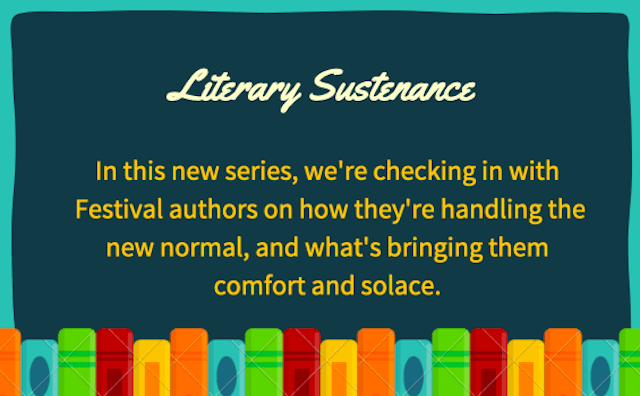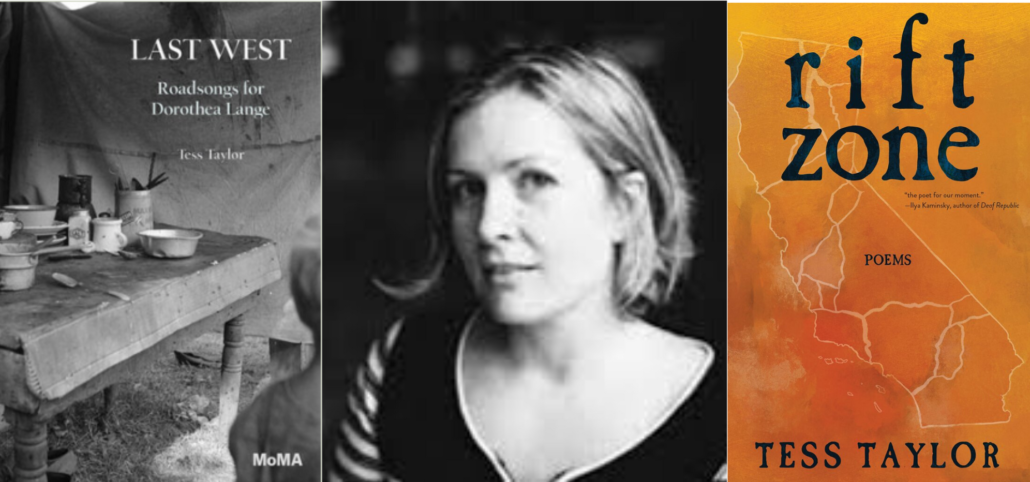“Sometimes I think all privilege is/
is some safer vantage/
for watching the trauma, America, happen.”
– “Untitled With Sadness and Suckle,” from Rift Zone by Tess Taylor, also the author of Last West: Road Songs for Dorothea Lange, Work & Days, and The Forage House
“In Rift Zone, racism is our fault line, is the rift we keep living in. Perhaps it is rift number one.”
Both of Tess Taylor’s 2020 poetry collections, Rift Zone and Last West, are deeply rooted in California: its ghosts, its land, and its legacies. For Tess, the need to excavate the region’s past, question its myths, and examine the complexities of its present runs very deep. A born-and-raised Californian who moved East for college, Tess has since returned to her roots in the East Bay city of El Cerrito. Her poetry comes to grips with what she considers a defining characteristic of California, one that echoes our current national mood: precariousness.
“The poems themselves,” she says of Rift Zone (published April 2020), “are about being precarious. They’re about living close to the brink, like we do in California. We live on a fault line, and we also live in a place where rent is skyrocketing and people live in fear of losing their healthcare or getting sick at the wrong moment. That’s the fear that’s animating the book, even while it’s saying that life is very beautiful.”
Tess’s other recent work, Last West (published in February 2020), is also deeply embedded within Californian soil. A collaboration with the Museum of Modern Art, Last West is a collage of poetry and black-and-white imagery, tracing the legacy of Depression-era photojournalist Dorothea Lange, following the roads she traveled in the 1930s and 40s, weaving Lange’s words and photos from that time with Tess’s own notes of visiting the same spaces today. As a Bay Area native, Tess brings Lange’s trek through California into intimate focus, blending oral histories and notebook fragments into a narrative that explores shelterlessness, migrancy, internment, and climate change, both in the eras Lange photographed them and as they emerge again today. The result feels both vast and intensely personal, and allows the past to rhyme uncannily with the present.
When BABF initially interviewed Tess in early May, we asked her about the astounding, even prescient relevance of both books’ themes. She replied, “The big irony is that the current world is more precarious then I possibly could have imagined. This moment is like being in a tidal wave.”
A few weeks later, we reconnected with Tess in the midst of the overdue rage and reckoning across the Bay Area—and the nation—in response to racist policing and the murders of George Floyd, Ahmaud Arbery, and Breonna Taylor, her statement about precariousness rang truer than ever. (The Bay, of course, is no stranger to ingrained patterns of racist injustice, as exemplified by the police killings of Oscar Grant, Alex Nieto, Willie McCoy, and so many more—including, most recently, 22-year-old Sean Monterrosa, shot and killed while on his knees by Vallejo police on June 2).
We asked Tess to speak to the current moment. Her answer, in its complexity and thoughtfulness, is one we want to let speak for itself.
BABF: One thing Rift Zone vividly explores is California’s—and specifically the Bay Area’s—complex history, including the racism and colonization that has shaped it. As a lifelong resident, can you speak to what we’re seeing now in our streets, and the changes that are brewing?
TT: Yes, at the heart of Rift Zone is a kind of trauma— the trauma of coming to understand and name how violent the world that has kept your body safe is. It’s partly about beginning to name some of the violence by which one’s own body (our civic body/ my body/ you name it) has been kept “safe.” And it’s about how just outside any beauty or safety in this country is violence that seems to exist in horrible co-relation: Rift Zone’s poems name kids who were shot while I grew up, kids who were jailed, as well as retracing the vast haunting inequity in our schools. There are lines about this: “you lug your dumb survivor’s grief.” or “how have you survived even this life” or “sometimes I think all privilege is / is some safer vantage/ for watching the trauma America happen.”
The speaker of these poems is talking to herself, and naming a pain she carries: even if she has managed to get through these spaces, by the accident of her body and its privilege, she lives in a society gripped in an abusive lie— [the lie] that it is fair, when it is clearly not. And this cannot help but unsettle us.
And when we stand in the rift, we grieve. Because to live in the presence of violent structural racism is damaging to all of us. It is damaging to children who receive it in the form of violence, but it is also damaging to children who learn it in the form of privilege which relies upon violence done to others.
Recently I was passing a very ill homeless man with my son, who was six. The man was in the throes of a breakdown, and we had to move along: it was not a good place for us to linger. Afterwards, I asked my son if he was upset. “I am scared for the man,” he said. And then he said: “I am scared for all of us, because we let that man be that way.”
Indeed: it is terrifying to live in a society that abuses and abandons people. This is the trauma we pass on to our children. When others are not free and safe, we are not free and safe. We can sidestep some, in private bubbles, and some of us can look away longer than others. But the truth is: the violence corrodes us. And we must name it and grieve it and we must change.


